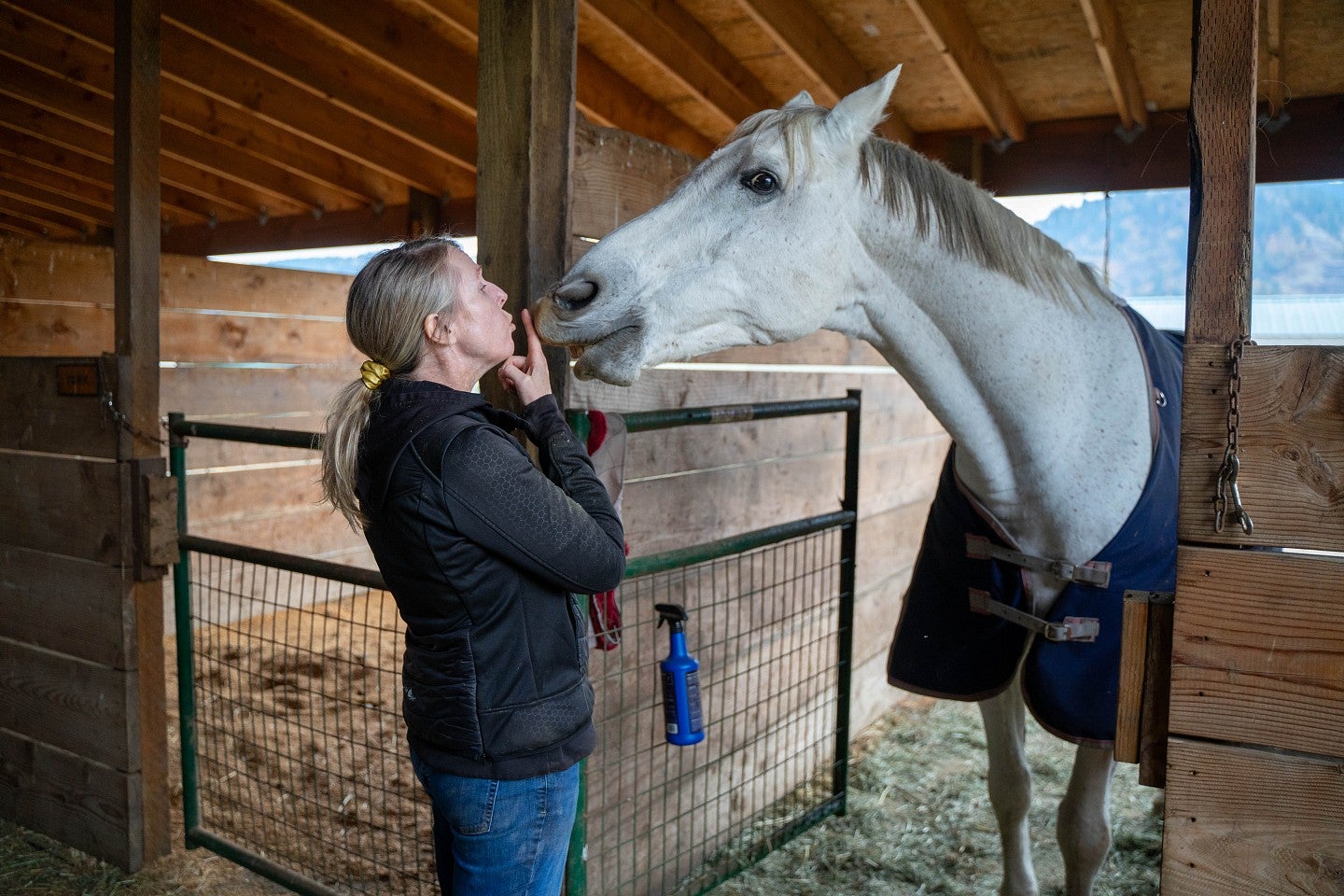
The Equestrian
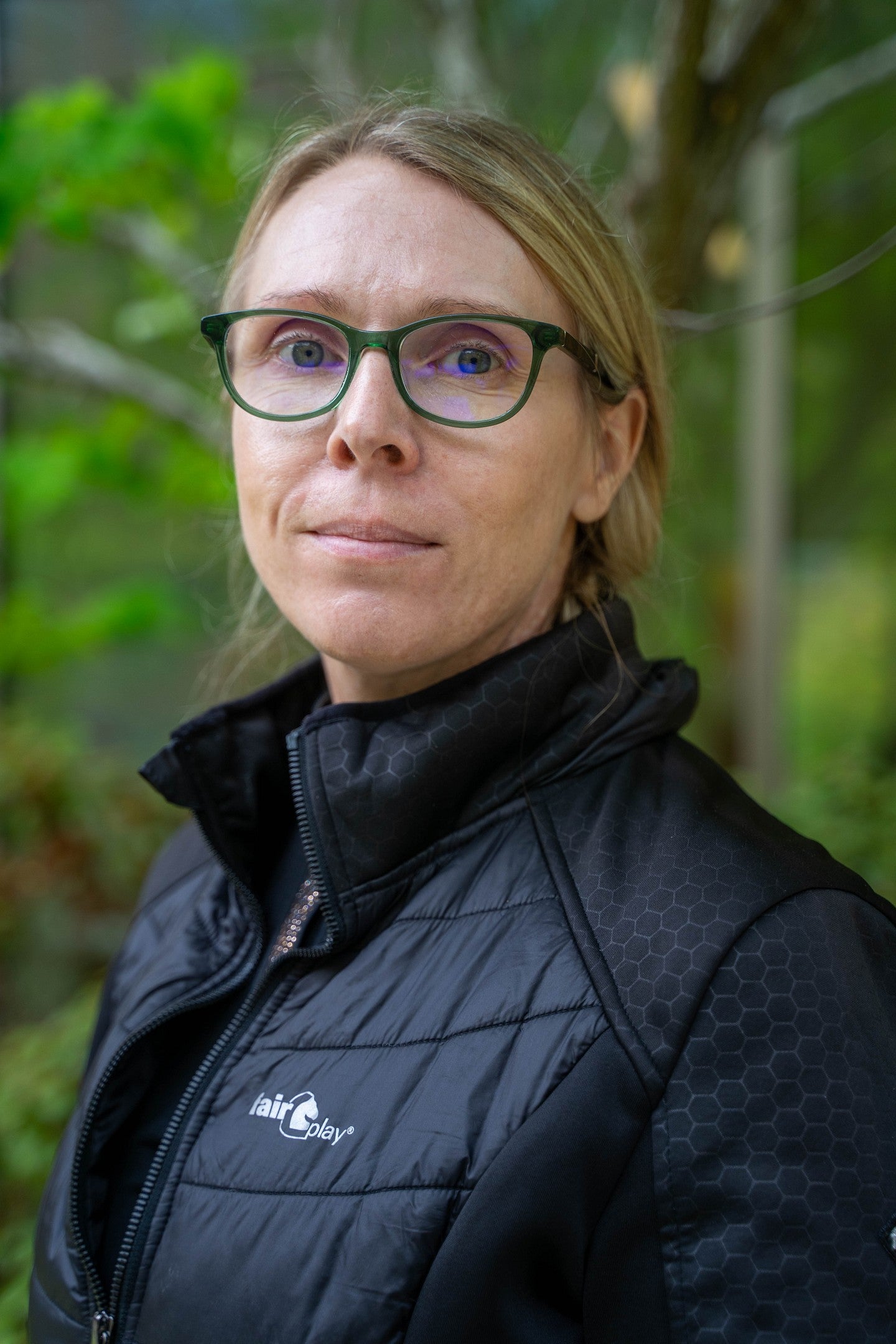
What’s in the fridge: A concerning amount of juice.
Guilty Pleasure: I like to watch Futurama on repeat. "Good News, Everyone."
Favorite Movie: So many. I really love Hot Fuzz.
Coffee or Tea: Neither. I like my caffeine to be carbonated.
Why I teach at the CHC: The dynamic community created by students, faculty and staff.
In the barn next to her Creswell home, Marisa King tends to her three horses, gently massaging their manes, feeding them treats and talking with each one as they stand in their stables.
King, an instructor of natural sciences at the Clark Honors College, believes her horses have taught her to be a more open and compassionate person. As a new core faculty member at the Clark Honors College, she hopes that same approach will help build connections with her students as she prepares to teach a variety of classes in the natural sciences.
A zoologist by training, King’s animals are crucial to who she is. “I believe working with horses probably has had more of an influence than any advisor or academic mentor,” she says. “You must be fair with horses. You have to come to it from a place of empathy.”
For the last 35 years, King has competed in equestrian dressage, where horse and rider perform a series of predetermined movements in an arena to develop the horse's athletic ability and willingness to perform. Each movement is scored by judges. She competes every year in the spring and summer months with her horse, Aachen.
New to the Honors College, King is teaching her first class this fall – “HC 101: Wildlife and Society.” The class focuses on investigating the influence of wildlife on urban areas, the creation of protected spaces, and the development of policies to mitigate human-wildlife conflicts.
In her class, King and her students have a continuously rolling online discussion board where students can post pictures of the animals they encounter on campus, from squirrels to turkeys and beyond.
Horses influence the classroom
King’s approach to teaching has been shaped over the years by her relationship with horses. She has used them and their behavior to connect with students. She has even brought them to campuses where she taught in the past, so students could visualize how their skeletal and muscular systems work.
Through horses, King says, “I've learned a lot of patience. I've learned a lot of empathy through learning more about my students' life experiences.” Once, for example, she learned that her student had a child and worked full-time, all while studying to become a nurse. “It’s not us versus them, faculty versus students,” she says. “We’re on this journey together.”
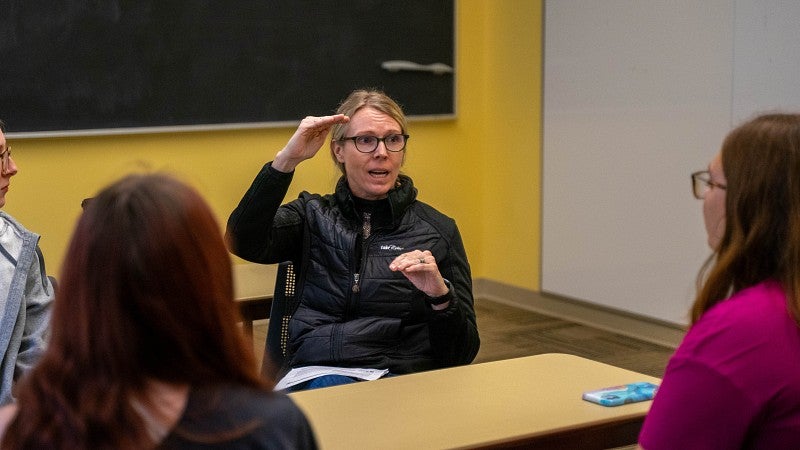
Her time riding and competing has given her many lessons in how to approach the faculty-student relationship. “I’m more aware of my surroundings and how my horse might react,” she says. “So, I also think: how would a student react to this? It's kind of a silly thing to compare the student body to horses, but you do.”
King grew up on a farm in Applegate, just south of Grants Pass along the Interstate 5 corridor where she developed a deep fascination with animals. At age six, she conducted her own scientific research, taking field notes on birds she observed. After her parents divorced, she split time between her father’s home in Applegate and her mother’s place in Ashland.
Her mother, a non-traditional student at Southern Oregon University, would bring her along to campus. “I would just hang out on the quad, ride my bike around while she was in class, or I'd go to class with her,” King recalls. “I think growing up in an academic setting like that, you're kind of drawn to it.”
King’s father worked as a forensic pathologist, an occupation that sometimes led to some morbid dinner-table conversations. King remembers one night when her father excitedly came home with a casket in the back of his truck with a fully articulated skeleton inside. “That casket sat in our living room for a couple of weeks,” King says. “It was kind of like a coffee table.”
Her father would “buy us McDonald’s and then take us to work with him,” she recalls. It is not surprising that she has developed a level of comfort with animal dissections.
She studied zoology as an undergraduate at the University of California-Santa Barbara, doing hands-on field research with avian species that took her to places like Alaska and Montana. She worked in a lab for three years before being accepted into a PhD program at Washington State University where she studied the avian immune system, focusing on house sparrows.
While completing her PhD in zoology, she met her now-husband, Matthew, who was working to earn a PhD in botany.
King recalled how she and Matthew, an Alberta, Canada native, would go out at night to the rolling hills of Pullman, Washington, where they lived. “At night, we’d look at the stars. We saw meteor showers out there,” she says. “We'd bring the dogs and let them just roam free.”
Sometimes, Matthew would build rockets and test them in the field. King would collect them for him after they landed. “I loved it,” she says. “The search and find aspect is the most fun thing for me.”
King describes herself and her husband as “just a couple of nerds that get along really well and have just been each other’s best friends for a long time. I’ve been his field assistant. He’s helped me in the field.”
The pair took their dogs with them when they eloped in the Haida Gwaii Islands off the northern Pacific Coast of Canada. “It was just the two of us,” she recalls. “I got little kerchiefs for the dogs, white with pink to match my dress. The dogs were running around the whole time.”
King collected shells on the beach during the wedding and gave them to family and friends when she returned home.
Zoology was not always the plan for King. But after taking a class on neuropsychology, she became enthralled with the sciences. “Sometimes, it just takes one class," she reflected. “I realized that I could be capable of the coursework and the load, and I started looking at the world from a different perspective."
Past professors play a role
She often thinks about going back and thanking her professor in the class. “I don't think they realized it changed my life,” she says. After earning her PhD, King completed her post-doctoral work at Washington State University and the University of South Dakota, where she studied avian metabolism and cold tolerance. Working under Professor Dave Swanson, she investigated the overwintering of birds migrating south from extreme-cold temperatures in Canada.
Swanson, who teaches biology, recalls the creativity and curiosity King brought to the lab, designing experiments and supervising graduate students. “She did quite a bit of supervision of graduate undergraduate students and kind of mentoring there and she excelled in that, too,” says Swanson.
They competed, he recalls, in “dissection races” to see who could most quickly break down and dissect the muscles of birds they studied. She reunited with her husband in Iowa after years apart when she concluded her research. King took a job as an adjunct professor, leading classes in anatomy and physiology at a local community college. She later worked as an assistant professor of biology at Grand View University, a small liberal arts campus in Des Moines.
The couple returned to Oregon during the pandemic to be closer to family. “It was like a weight lifted off our shoulders, coming home,” she says. Backdropped by rolling hills, the stables are where King feels most at peace. “Everything else just melts away,” she says. “I just get to be here in the moment. It’s very grounding.”
“It was like a weight lifted off our shoulders, coming home. Everything else just melts away. I just get to be here in the moment. It’s very grounding.”
At home, her horses are the center of her world and King makes a point of spoiling them. She has an 18-year-old named Aachen, a 1,200-pound gray gelding who loves to eat Skittles for a snack.
Aachen responds to her indulgence by giving her high fives with his nose, kisses, and even hugs when she asks for them by wrapping his neck around her. Her relationship with Aachen is not one of pet and owner, but instead one of peers. “I've had him for 15 years. That's a 15-year partnership,” she says.
Her two other horses include York, a picturesque chestnut saddlebred she has had for almost a decade. “He's the most playful,” she says. “He’s always in your face, asking for attention.”
Then there’s Brownie, her pony and newest addition to her family. Because of Brownie’s petite size, the horse is sometimes allowed into the house. She is quiet and gentle but doesn’t like to interact with the bigger horses. “They get all over her,” King says. “She definitely has ‘little dog’ syndrome.”
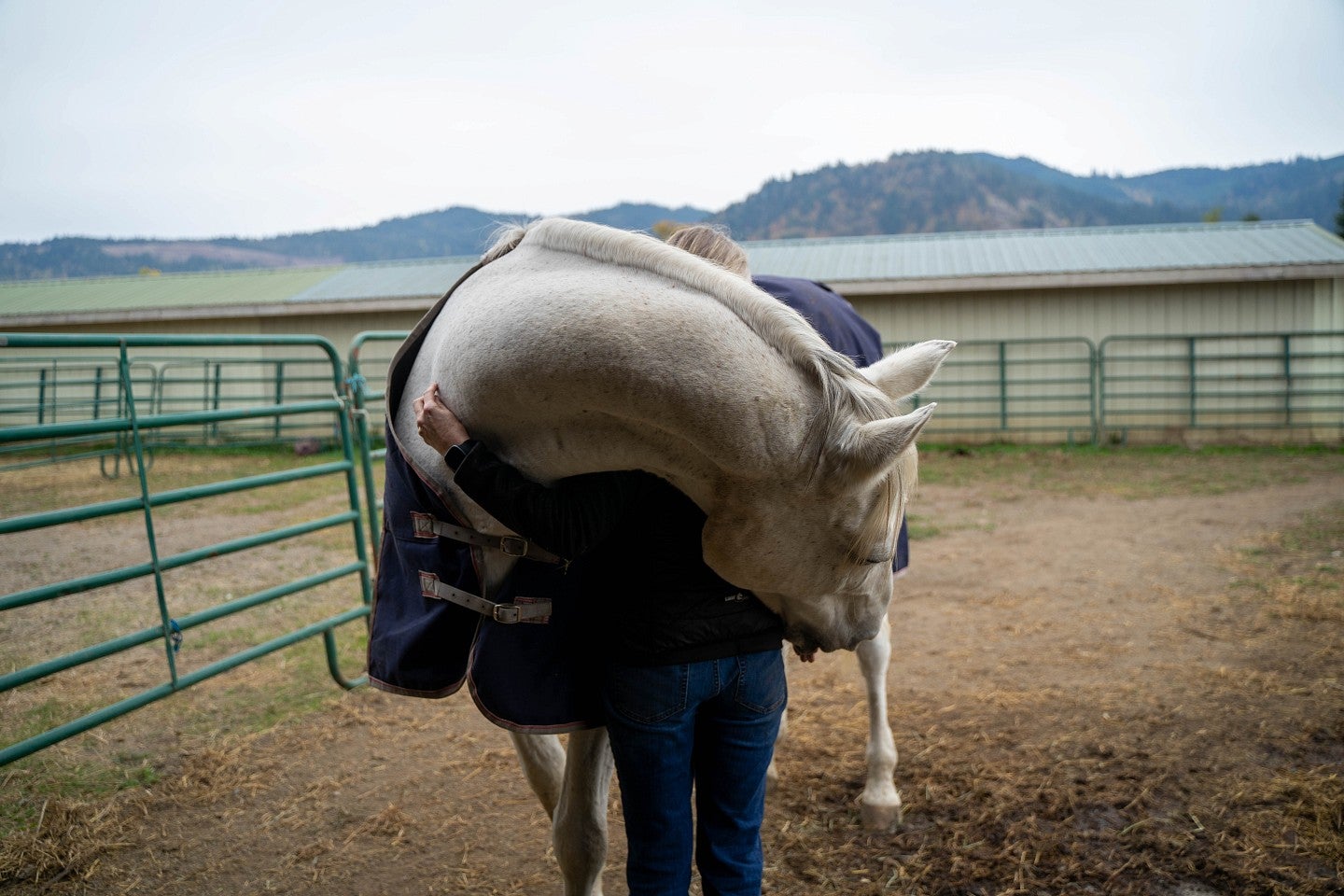
King was working as a professional tutor when the Honors College position opened. One of her students was a veterinarian who was studying to become board certified in pathology. “Being able to work one-on-one with someone is amazing, especially when they’re really dedicated,” King says now.
It is the same dedication she sees in her CHC students, as well as their diverse backgrounds and interests, that excites her. “I’ve been really impressed with how the different majors are able to contribute to the classroom experience,” she says.
King sees her classroom as a training ground. “I like my classroom to be a safe place for students to fail and then pick themselves back up,” she says. “Because those are the experiences we remember and that stick with us, especially when we turn things around.”
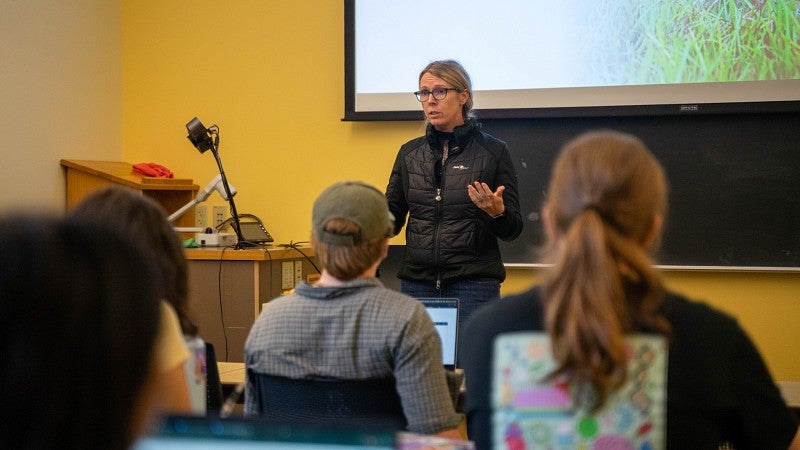
Amelia Evers, a first-year student from Portland, says King seemed eager to welcome her service dog, Electron, into the classroom.
Kamryn Wenz, who is in her first year and comes from Washington state, says King’s passion for biology is palpable. “This is her life, and she's so passionate about sharing that, and we love to just hear her talk,” Wenz says.
For her part, King says her connection to her students is strong because she wants them to feel excited and comfortable asking questions in her classes. “It really comes down to asking a question and answering it, no matter what your area of study is,” King says.
She likes the small class sizes at the CHC and has organized various trips for her students. Stops include the Museum of Natural and Cultural History and the Price Science Commons and Research Library.
As she leads Aachen around the perimeter of her farm, King thinks about another way she can put her trusted friend to use. She hasn’t ruled out a trip to Eugene with Aachen. It’s something she did for her students’ entertainment and research when she was teaching in Iowa.“If I can find a parking spot big enough for a horse trailer,” she says.
